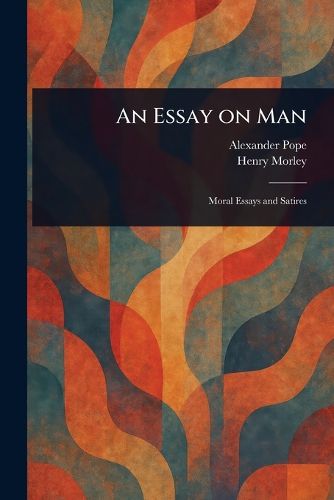Readings Newsletter
Become a Readings Member to make your shopping experience even easier.
Sign in or sign up for free!
You’re not far away from qualifying for FREE standard shipping within Australia
You’ve qualified for FREE standard shipping within Australia
The cart is loading…






This title is printed to order. This book may have been self-published. If so, we cannot guarantee the quality of the content. In the main most books will have gone through the editing process however some may not. We therefore suggest that you be aware of this before ordering this book. If in doubt check either the author or publisher’s details as we are unable to accept any returns unless they are faulty. Please contact us if you have any questions.
Alexander Pope's "Essay on Man: Moral Essays and Satires" is a cornerstone of 18th-century English poetry, delving into profound questions of ethics and moral philosophy. This collection presents a compelling exploration of humanity's place in the universe, examining themes of order, reason, and the nature of good and evil.
Through meticulously crafted verse and sharp satire, Pope dissects human nature and societal norms, offering insights into the complexities of morality. The essays, presented in poetic form, engage with timeless philosophical questions, making this work as relevant today as it was centuries ago.
A significant contribution to literary criticism and philosophical discourse, "Essay on Man" showcases Pope's mastery of language and his keen understanding of the human condition. This edition offers a fresh encounter with these influential poems, perfect for those seeking intellectual stimulation and an appreciation for classic literature.
This work has been selected by scholars as being culturally important, and is part of the knowledge base of civilization as we know it.
This work is in the public domain in the United States of America, and possibly other nations. Within the United States, you may freely copy and distribute this work, as no entity (individual or corporate) has a copyright on the body of the work.
Scholars believe, and we concur, that this work is important enough to be preserved, reproduced, and made generally available to the public. We appreciate your support of the preservation process, and thank you for being an important part of keeping this knowledge alive and relevant.
$9.00 standard shipping within Australia
FREE standard shipping within Australia for orders over $100.00
Express & International shipping calculated at checkout
This title is printed to order. This book may have been self-published. If so, we cannot guarantee the quality of the content. In the main most books will have gone through the editing process however some may not. We therefore suggest that you be aware of this before ordering this book. If in doubt check either the author or publisher’s details as we are unable to accept any returns unless they are faulty. Please contact us if you have any questions.
Alexander Pope's "Essay on Man: Moral Essays and Satires" is a cornerstone of 18th-century English poetry, delving into profound questions of ethics and moral philosophy. This collection presents a compelling exploration of humanity's place in the universe, examining themes of order, reason, and the nature of good and evil.
Through meticulously crafted verse and sharp satire, Pope dissects human nature and societal norms, offering insights into the complexities of morality. The essays, presented in poetic form, engage with timeless philosophical questions, making this work as relevant today as it was centuries ago.
A significant contribution to literary criticism and philosophical discourse, "Essay on Man" showcases Pope's mastery of language and his keen understanding of the human condition. This edition offers a fresh encounter with these influential poems, perfect for those seeking intellectual stimulation and an appreciation for classic literature.
This work has been selected by scholars as being culturally important, and is part of the knowledge base of civilization as we know it.
This work is in the public domain in the United States of America, and possibly other nations. Within the United States, you may freely copy and distribute this work, as no entity (individual or corporate) has a copyright on the body of the work.
Scholars believe, and we concur, that this work is important enough to be preserved, reproduced, and made generally available to the public. We appreciate your support of the preservation process, and thank you for being an important part of keeping this knowledge alive and relevant.